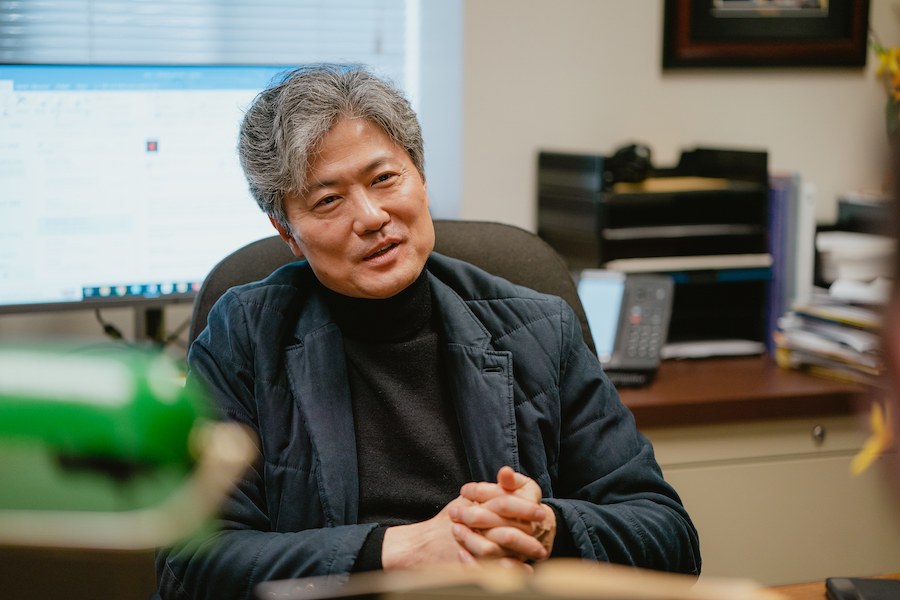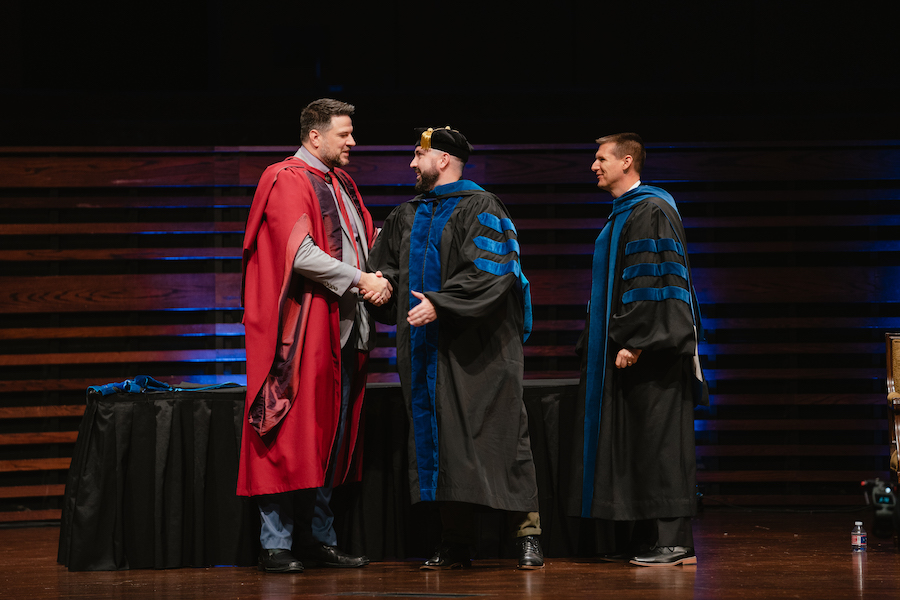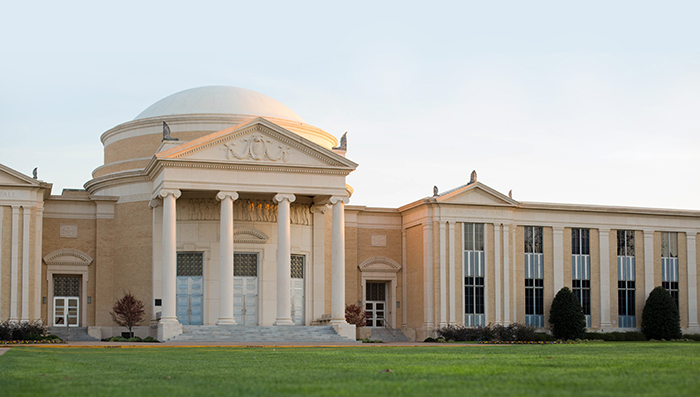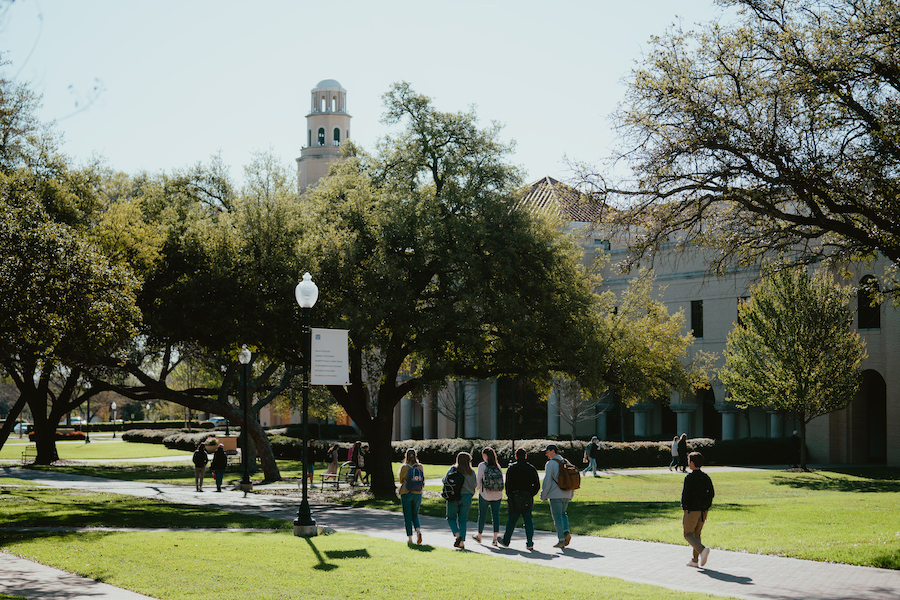Two alumni and two students who are engaging the culture
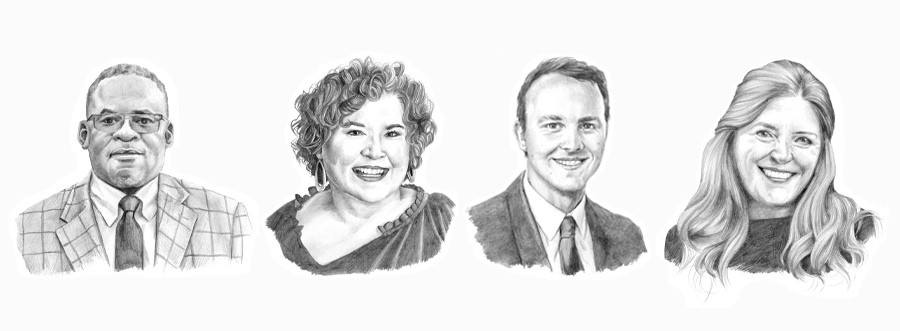

Editor’s note: this article appears in the Fall 2021 issue of Southwestern News.
Ryan Johnson: Embracing the call to defend freedom
For Ryan Johnson, a current Southwestern Seminary Master of Theological Studies student from Houston, Texas, defending religious liberty is not only about its implications in the public sphere, but also about allowing the church to mobilize for the sake of the Gospel.
Although his background is in federal law enforcement, Johnson now serves as the vice president of ambassador and alliance relations for the Alliance Defending Freedom (ADF), a faith-based legal and advocacy firm. Through the ADF Ambassador Program, Johnson is leading efforts to mobilize like-minded Christians to make an impact on the culture through a partnership with the organization.
After recently returning to Southwestern Seminary to complete the educational pursuit he began in 1994, Johnson says a degree will provide a necessary foundation for a biblical approach to cultural engagement.
“I just wanted to be the best-equipped theologian I possibly can so that I can help equip other Christians to know the truth, and that’s what I’m really trying to come back to,” Johnson says.
Johnson first joined the ADF Ambassador program in 2010 (while it was known as Alliance Defense Fund). He had become increasingly troubled with what he believed to be a threat to religious liberty in the United States, and wanted to do his part in “defending freedom.”
“[ADF] really captured my heart because I was really concerned about the things that were taking place in our country today as it relates to religious liberty, the sanctity of life, freedom of speech, parental rights, and marriage and family,” Johnson says. “This organization was really on the frontlines of protecting your constitutional God-given inalienable rights as it relates to those issues.”
After assuming his new role, Johnson implemented a new vision and strategy to grow the Ambassador program, and has done so successfully, growing the program from 449 Ambassadors in 2019 to approximately 975 in 2021—and it’s continuing to grow.
Johnson says his primary vision for the program was to cultivate an alliance of people who wanted to engage the culture from a perspective that was “rooted and grounded in Scripture and encapsulated in the cross.”
“Ambassadors are the special envoy that helps to do that,” Johnson adds. “Ambassadors are the bridge builders connecting their church, communities, and spheres of influence to the mission of advancing the Gospel.”
Ambassadors serve on a volunteer basis and support ADF through four main areas: connection, prayer, giving and service. They help raise awareness for the organization, pray, and offer financial giving to support the firm’s pro bono work. Additionally, Ambassadors also work with legislative and advocacy teams to advocate for legislation that reflects biblical values, recognizing that the implications of what happens in local, state, and national government will have a significant impact on Christians’ ability to live out their faith and to preach the Gospel.
“I want the church to be able to mobilize, galvanize, and mobilize around this effort of religious freedom because I understand that this is a freedom that we can’t afford to lose,” says Johnson. – K.C.
Kat Shanks: Encouraging caring for souls while speaking for sanctity of human life
As a 20-year-old college student at Palm Beach Atlantic University in West Palm Beach, Florida, Kathleen “Kat” Hiers Shanks (’94) was volunteering at the local crisis pregnancy center when she met her first client. Michelle, also a 20-year-old, had two little kids in tow and was pregnant with her third child. Shanks could hear Michelle’s stomach growling “because she hadn’t eaten for several days” due to feeding her children and not herself. Shanks found food for Michelle and her children and walked with her for the next several months until she had her son, a month before Shanks graduated from college.
Shanks says, “I had no idea that … would become the work of my life,” but it has. With the encouragement of her then-pastor, Jack Graham (’76, ’80), Shanks enrolled at Southwestern Seminary. Tearfully, she explains her time on the Fort Worth campus shaped her “in a thousand ways.” As professors, including Tommy Lea, Jack MacGorman, Bill Tolar, Bert Dominy, and others taught her the lessons of Greek and Hebrew, they also taught her how to handle the Word of God in order to care for souls. These are lessons Shanks uses daily as she serves as the executive director of the New Path Pregnancy Centers based in Marysville, Ohio.
Shanks, who previously served for eight years as the director of sanctity of human life for the Florida Baptist Convention, began her current ministry assignment in September 2009. In her role, Shanks meets practical needs while pointing women to Christ. She says, “People coming alongside you to help you can change everything, but infinitely more than that, the God of heaven can change everything.”
The opportunities to come alongside women and share the Gospel are vast because “there is an entire mission field of broken people who have blood guilt on their hands because they chose abortion,” says Shanks. “Some of them chose it in ignorance. They had no idea what they were doing. They genuinely didn’t. They believed the lie it was just a clump of cells.”
Shanks says Christians should “talk about [abortion] with broken hearts…and gentleness and such mercy,” while also proactively teaching teenagers a “sanctity of human life apologetic” that helps them to think biblically about life.
Shanks encourages believers who want to get involved in pregnancy resource ministry to first pray because “this is a spiritual battle.” Pastors, women’s ministry directors, and others can call local their local pregnancy resource center and learn how they can be praying. Second, she encourages local churches to invite pregnancy resource center directors to speak at churches to hear the needs in the local community.
“It is absolutely, vitally important that the church maintain a Christ-exalting approach to defending the sanctity of human life,” Shanks concludes. – A.A.
David Closson: Seeking to equip believers with a biblical worldview
When the Family Research Council (FRC) launched the Center for Biblical Worldview in May 2021, the aim and mission was to equip “pastors, Christian leaders and just regular Christians to think through things through the perspective of a biblical worldview,” says David Closson, director of the center and current Ph.D. student in Christian ethics at Southwestern Seminary.
Closson, an Orlando, Florida, native said the need for the center was validated by a 2021 survey among Americans by nationally recognized pollster, George Barna. Measuring for belief and behavior, rather than allowing participants to self-identify, Barna’s research found that 51 percent of Americans think they have a biblical worldview while only 6 percent actually do. Even among evangelical Christians, while 81 percent believe they have a biblical worldview, only 22 percent do, according to Barna.
As culture drifts further away from truth, the center seeks to help equip pastors and church leaders with resources to “come alongside people to think faithfully about these issues,” Closson says. The free resources the center provides include video interviews, articles, and booklets that address life, religious liberty, sexuality, and political engagement.
Recognizing that pastors and other church leaders have members of their congregations “asking them about these hot button social issues” like sexuality, religious liberty and politics. Closson says he hopes the center can “save pastors and ministry leaders a lot of time and help them get equipped and brushed up on all these issues so they can be more faithful in the work that God’s called them to without having to become an expert on every issue in the political and cultural world.”
Equipping believers with a biblical worldview is important to him because “I care about truth and care about God’s Word,” Closson says.
“The Bible speaks to every issue that we face; it gives us principles,” Closson continues. “One of the reasons I get so passionate about these issues is because I think the Bible does have a clear word and as our culture has become increasingly [biblically] illiterate, and as churches are becoming less biblically focused, I just see a massive need amongst the church at large for sound biblical teaching on the issues that our culture is dealing with.”
Closson says the “high view of Scripture” his professors at Southwestern Seminary have is what he wants to share with others. He adds he is grateful to be “a student at Southwestern because all of us are in need to be able to be thinking more faithfully and accurate about these things.”
“The encouragement and support that I’ve already received from Southwestern has reminded me that the work I’m doing is important; it’s needed,” Closson adds. – A.A.
Gayla Parker: Supporting women in crisis
In her years of ministry experience to women, 2017 Master of Divinity graduate and current Ph.D. student, Gayla Parker, says the words of one woman stand out to her.
“If there had been just one person to stand with me, maybe I could have found the courage to have done something different,” the woman said with tears streaming down her face, remembering the abortion she had 22 years prior.
Parker serves as the executive director of the Pregnancy Resource Center for Southwest Arkansas, where they stand with women through unplanned pregnancies. Prior to her current ministry role, Parker and her husband served as International Mission Board missionaries to the Philippines for 14 years before returning to the United States in 2002. She then served as a student consultant for the Arkansas Baptist State Convention from 2002-2006, and then as the Woman’s Missionary Union (WMU) Executive Director for the Baptist Convention of Maryland and Delaware from 2006-2013. After the Lord called Parker and her husband back to Little Rock, Arkansas, she served for a time as a hospice chaplain before stepping into her current ministry assignment in 2019. Parker has also served as an adjunct professor at Ouachita Baptist University since 2017.
Through her connection with a network of seminary women, including Dean of Women Terri Stovall (’91, ’01, ’12), Parker says God led her to strengthen her ministry to women through theological education at Southwestern Seminary, where she first enrolled in 2014.
Parker says the impact of the education she has received from Southwestern Seminary is most evident in how she approaches conversations with clients and in decisions for the pregnancy center.
“To rightly handle the Word is not just our interpretation of that Word, but the way in which it influences every area of our life including our actions,” says Parker.
Parker says the pregnancy center welcomes women from all walks of life and circumstances. Counselors meet with each woman to find solutions to their concerns, and counsel them to forgo an abortion if that was their original plan. Through the parenting classes, Parker says they believe that the best way to parent is to first “have a vibrant relationship with the Lord.”
“We are there to share the Word of God. We do that by reading His Word, praying for them, and by having a devotional time with them, discipling them, or whatever is appropriate for the client that’s coming.”
While they seek to address many practical needs including pregnancy tests, infant and child supplies, and parenting classes, Parker says they also aim to show care and compassion for women who are often facing a challenging situation.
“We’re not just fighting for the baby; we’re fighting for the mom because we know that the impact on women is huge and will often make them suicidal, nonfunctional, all of those things,” Parker notes.
“We’re fighting for two lives when we’re in the counseling room trying to talk someone off the cliff of abortion.”
The pregnancy center also offers after-abortion care, recognizing that many women experience loneliness, depression, and guilt. Parker explains that, although they talk about the horror of abortion, they must also show women compassion and that they are still loved and can be used by God.
Just as the woman who expressed regret for abortion desired support, Parker says she and the pregnancy center aim to be the people who say to each woman who enters their facilities, “I will be that one person that will stand with you through this pregnancy to give you the courage to do this.” – K.C.
Ashley Allen is the managing editor of Southwestern News. Katie Coleman is a news writer for Southwestern News.
